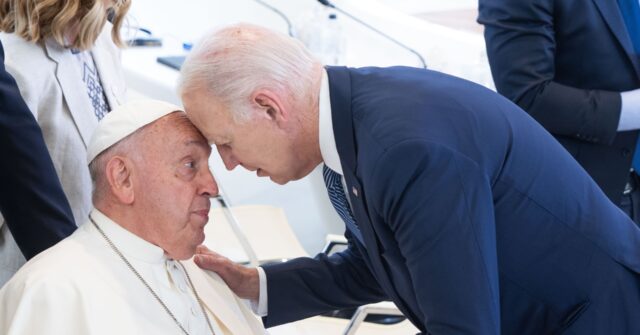In a significant diplomatic move, President Joe Biden is set to travel to Italy in January for a meeting with Pope Francis, alongside Italian Prime Minister Giorgia Meloni and Italian President Sergio Mattarella. The visit, scheduled for January 10, follows a phone conversation between Biden and the Pope, during which Biden accepted the invitation to meet at the Vatican. The primary agenda of the meeting with the Pope will focus on “efforts to advance peace around the world,” as stated by White House Press Secretary Karine Jean-Pierre. Additionally, the discussions will involve Biden’s conversations with Italian leaders, emphasizing the strong ties between the U.S. and Italy, while also expressing gratitude for Meloni’s leadership at the G7. Amid these diplomatic engagements, underlying tensions regarding Biden’s stance on pivotal Catholic issues remain prominent.
Despite being a practicing Catholic, President Biden’s relationship with the Catholic hierarchy has faced scrutiny since he assumed office in 2020. His support for policies widely viewed as contrary to traditional Catholic teachings—such as taxpayer-funded abortion and transgender rights—has created strife within the Church. Bill Donohue, the President of the Catholic League, pointedly highlighted the unprecedented opposition Biden has displayed towards core Catholic beliefs, characterizing his administration as actively working against fundamental Catholic doctrine on issues like marriage and family. Such remarks underscore a growing discord between the president and various Church leaders, particularly in light of his administration’s policies, which some cite as contradictory to the Church’s moral teachings.
The U.S. Bishops, representing the Catholic clergy, have been notably critical of Biden’s policies, especially regarding his approach to healthcare and transgender rights. Their condemnation intensified after Biden reinstated taxpayer-funded abortions globally shortly after taking office. Statements from bishops, including Archbishop Joseph Naumann, emphasized the grave moral implications of promoting abortion, framing it as fundamentally opposed to human dignity and Catholic teachings. The bishops have called Biden’s executive actions not only grievous but also incompatible with the Church’s doctrines, reiterating that Catholic politicians have a solemn duty to oppose laws endorsing abortion.
Biden’s stance on abortion has drawn sharp disapproval not just from conservative factions but also from some within the liberal Catholic community. Even Cardinal Wilton Gregory of Washington, D.C. referred to Biden as a “cafeteria Catholic,” indicating that the president selectively adheres to certain Church teachings while disregarding others. This sentiment reflects a broader concern regarding Biden’s portrayal as a devout Catholic, despite actions that seem to contradict the Church’s unequivocal stance on the morality of abortion and the sanctity of life. Biden’s assurances to support and expand abortion rights, famously highlighted during his campaign, signal an ongoing commitment to policies that diverge starkly from traditional Catholic values.
The upcoming trip to Italy is anticipated to be one of Biden’s final official foreign engagements before Donald Trump potentially resumes the presidency. The political context adds another layer of complexity to the visit, particularly considering Meloni’s public alignment with Trump and his advisors, reflecting the evolving dynamics within both U.S. and Italian politics. As Biden meets with Meloni and other leaders, the conversations will encompass the broader challenges confronting the globe, alongside affirmations of the U.S.-Italy relationship, signaling an intricate balancing act as he navigates domestic Catholic opposition and international diplomacy.
In summary, Biden’s scheduled meeting with Pope Francis and Italian leaders epitomizes the ongoing intersection of faith, politics, and diplomacy in a global context. Amid commendations for strengthening international relationships, significant concerns linger about the moral implications of Biden’s policies as they relate to Catholic teachings. His visit could reflect an effort to mend or clarify relations with the Church, even as criticisms persist. As Biden approaches these discussions, the challenge remains to align his political actions with the expectations and values of the faith that has reportedly guided him throughout his life, particularly as he faces potential political transition come January.

